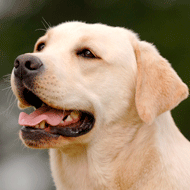Quarter of Crufts dogs overweight

One in four dogs competing at Crufts is overweight, according to the University of Liverpool.
A study by the University of Liverpool has found that one in four dogs competing at Crufts is overweight.
The research, published in Veterinary Record, reveals that up to 26 per cent of the best show dogs, such as basset hounds, pugs and labrador retrievers, weigh more than they should.
The team analysed over 1000 photographs of 28 dog breeds that had been placed first and fifth in their class during competitions between 2001 and 2013.
They found that of the 960 graded suitable for assessment, 74 per cent were in an 'ideal' condition, but 26 per cent were overweight. The results are consistent with findings from a similar study undertaken in the Netherlands, which demonstrated that 19 per cent of show dogs were overweight.
Dr Alex German, from the University’s School of Veterinary Science, said: “The results of both these studies are concerning because show dogs are assumed to be perfect specimens of their breed and, if significant numbers are overweight, this may ‘normalise’ obesity in the eyes of the public. The reality is that this condition causes significant health issues for dogs, including arthritis and diabetes.
“We found that 80 per cent of pugs, 68 per cent of basset hounds, and 63 per cent of labradors were overweight. When we consider hounds and labradors were originally bred for hunting, bring in fishing haulage, and other fielding work, being overweight can be detrimental to their physiology and overall wellbeing.”
The Kennel Club, which organises and hosts Crufts, has introduced changes in its judging criteria to emphasise characteristics that promote good health. Liverpool University are also working with the organisation to raise awareness of obesity amongst dog breeders and the general public.
“We want to ensure that the widespread media coverage of these competitions does not influence owner perception on the best body shape for their dogs," said Dr German.
"Arthritis and diabetes are now a common condition in obese dogs, as well as respiratory diseases and some types of cancer. Working closely with partners, we hope to help tackle these issues to improve the health and wellbeing of companion animals,” he adds.
The Kennel Club say that they are committed to tackling health problems in dogs and take the issue of canine obesity very seriously.
Aimée Llewellyn, Kennel Club's health information manager, said: “In 2014 we introduced the ‘Breed Watch’ scheme, designed to act as an early warning system to increase awareness of possible health problems in specific breeds. As the research looked at images up to 2013, the effects of this initiative have not been taken in to account.
“We strongly believe that the show ring can positively influence the health of dogs, since judges are trained to only reward healthy dogs and we are looking forward to welcoming Alex German to our upcoming breed health seminars where he will be discussing obesity.”



 RCVS Knowledge has welcomed Professor Peter Cockcroft as editor-in-chief for Veterinary Evidence.
RCVS Knowledge has welcomed Professor Peter Cockcroft as editor-in-chief for Veterinary Evidence.